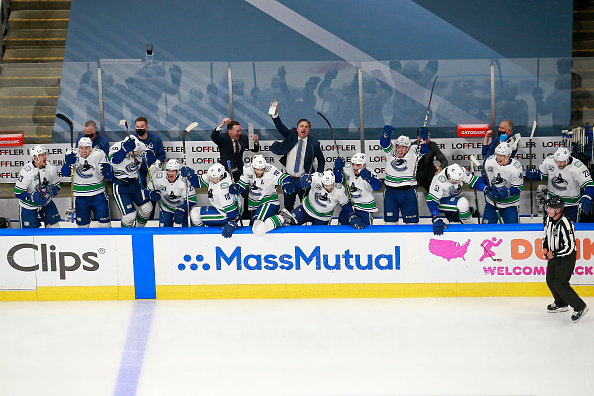With twenty games in their pocket, it’s time to look over the Vancouver Canucks at the quarter pole. And it looks… weird.
Confounding Canucks at the Quarter Season
Every team is going to have some players on it who exceed expectations and some who disappoint. But generally, if the team is doing well, most of the players will be doing likewise. If it’s doing badly, the same will be true of many of the players. It’s not an ironclad rule, much the same way that goal differential is a reasonable guide to performance.
That all being said, there remains the perpetual WTF team: the Vancouver Canucks.
The Canucks aren’t a good team this year, which is a disappointment to fans and management alike. Though given the President of Hockey Operations’ recent quotes he may have been expecting it. He just didn’t, you know, do anything to fix what he apparently thought was oncoming doom. But we’ll get to that.
Hitting Highs
Deep breath, Canucks fans, then release it because good things have happened this year. Rewarding individual players with accolades is the last resort for a bottom-feeding team, but it’s not all “well, this guy’s good!” But most of the good news is, so let’s get to naming names.
Elias Pettersson
Obvious selection is obvious, but Elias Pettersson has elevated his game in a dramatic way. Yes, his scoring has been rock-solid since last season, but his two-way game is also rounding into shape. Pettersson has always worked hard to improve himself, but his experience is starting to shine. He’s predicting plays the other team can make and positioning himself to cause the most trouble for them. He’s blocking shots, intercepting passes, and driving back hard when a play goes sideways. Add his newfound point-per-game scoring pace and he’s going to start picking up Selke Trophy votes.
Russians Are… Good?
Given the legendary hesitancy of the Canucks to draft Russian players, it’s a bit of a surprise two arrived in free agency. Even better is how Ilya Mikheyev and Andrei Kuzmenko have each brought something lacking to Vancouver. Mikheyev’s shooting percentage is substantially over his career level, but not far off last season’s 21-goal breakout. He’s certainly in line to repeat the result, but more than that is his speed. Clearly the fastest player in the lineup, Mikheyev adds a play-disrupting presence on the attack and a threat short-handed.
Kuzmenko was a wildcard coming to the NHL, but so far he’s paid off. He isn’t the fastest player and can get burned defensively, but his hockey IQ on the attack is very good. He finds empty spaces for passes to get to him and can hold the puck until a scoring opportunity opens up. Sure, he might not be able to maintain a 30-goal, 65-point pace for the entire season, but there’s little reason to expect him to drop off it, either. For a player earning an entry-level deal (with Schedule A bonuses) that’s a bargain any way you slice it.
The Fourth(-ish) Line
In years past, the Canucks fourth line was a regular target of critics – and for good reason. Old, expensive, and ineffective aren’t the descriptors wanted on any player, never mind an entire line. Jim Benning‘s habit of signing veterans to long-term deals to play ten minutes a game was arguably his worst. That’s fallen well to the wayside now. The rotating cast of cost-effective journeymen Curtis Lazar, Dakota Joshua, and Sheldon Dries are joined by Nils Åman and Jack Studnicka. Those last two are younger and eager to prove their worth with a new team. And if they haven’t been perfect, they are a decided relief from previous years.
Kyle Burroughs
Sure, Luke Schenn is the very popular “unsung hero” of the Canucks blue line. But for players who are actually less known, Kyle Burroughs is Vancouver’s exemplar. He’s taken just two minor penalties so far this season – but has three fighting majors. On a team notorious for being easily intimidated, the 6′ tall, sub-200 pound Burroughs plays with intensity and hits with purpose. Locked onto the third pair in 2021-22, he’s currently averaging over 18 minutes a night in his 11 games. Dirt cheap and Vancouver-born doesn’t hurt, either.
Writing up an article and mention how few minors Burroughs takes. Dang it.
Still: no blood, no foul!
— ErinLWOH (@ErinLwoh) November 27, 2022
C’mon, man!
Offence Everywhere
Vancouver is a top-five team on the power play, top-ten in scoring. That should make up for any glaring issues on defence, right? Right, folks? Right?
Dragging Lows
There are individual players in this list, too, but we’re going to try to keep it polite. There are a lot more things that have gone wrong for the Canucks at the quarter than just some player performances, but they sure haven’t helped.
Oliver Ekman-Larsson
As far as his boxcar stats go, Oliver Ekman-Larsson has been fine. Decent, even, with a goal and nine points in his first 20 games. No one expects full value from his $7.26 million tag at this point, but last season wasn’t terrible. But his use last year was mostly in a defensive match-up pairing with Myers. That cost him some of his offence, which frankly he does better than defending. But the defence has to be there for any skater who plays as much as Ekman-Larsson, and so far this year he’s been a second late and a step behind. He hasn’t quite been clicking with the rest of team and that’s hurt.
Thatcher Demko
Speaking of being just a touch late, Thatcher Demko‘s performance has been possibly the biggest shock of the year. He hasn’t had the confidence that is so necessary for any goaltender, and it shows. Some of this comes from the team in front of him not stopping cross-ice passes, leaving him to face much harder-to-stop shots. But the other side of that is when he starts to cheat in anticipation of that pass. Shooters in the NHL can smell that and will hit the high shoulders or waist-high gaps that can appear. Demko is far too skilled to stay this bad, so it’s not like there’s a goalie controversy in Vancouver. Spencer Martin‘s pedestrian numbers are better than the starter’s, but won’t be for long.
Defensive Everyone
Oof. As Ekman-Larsson’s numbers went down on his side of the puck, Myers’ followed. Among the forwards, the usually reliable Tanner Pearson has had a nightmare start to the season. He’s picked up a slew of minor penalties by losing his man in the offensive zone and getting outrun back to the defensive end. As another forward at the high end of the pay scale for what he provides, any regression is fatal. His injury will hopefully give Pearson a chance to reset when he returns.
Then there’s the penalty kill. Oh, the penalty kill. The Vancouver Canucks at the quarter have, once again, the worst penalty kill in the league – just like last year. There are only so many systems to use when teams are down a man (or two). The biggest problem isn’t systems or coaching when it comes to defending against the power play, it’s work. Players MUST outwork the attacking team if they are going to have any hope of getting out alive. Scoring can hide a lot, but it can’t do everything!
Good? Bad? We’re the One With the Goals
Bo Horvat
The Canucks at the quarter have the leading goal-scorer in the NHL. Well, briefly tied with Connor McDavid and Jason Robertson, anyway, and that’s a whole lot more than anyone expected. Fans love it, the team loves it, Bo Horvat himself loves it, and Horvat’s agent is doing frikkin’ cartwheels. Unfortunately for team management, he is scheduled to be a free agent at the end of the season. In any sane world, Horvat’s scoring spree would be awesome news for the White Collars.
While the team can in theory afford to sign him, in practice that will bounce them once again off the salary cap ceiling. The new managers have clearly taken a hostile approach to negotiations and now it’s blowing up in their faces.
J.T. Miller
The point of the game is points, right? Well, J.T. Miller has you covered with 11 goals and 23 points in his first 22 games. Now, if you’re including taking responsibility for your defensive play, well… But Miller is here to get the offence going, and there’s no doubt about that. The anxiety is whether he can continue to do so into his shiny, new 7-year contract. No, he won’t, but even if he drops to “merely” a point-per-game pace for the next few seasons, it should pay off.
Miller will be worth it for as long as the Canucks are pushing for the playoffs.
Brock Boeser
Brock Boeser has never been a point-per-game player but hit mid-November with 13 points in 14 games. His production has been good – for any normal player. But he really shouldn’t be just a “normal player” given his goal-scoring acumen. Hitting 20 goals should be a doddle for Boeser at this point, and his pre-season prediction of breaking 30 wasn’t far-fetched. Alas, unless the remaining games Vancouver plays are all against the Los Angeles Kings* that seems a distant mark. And two years to go on his contract after this one at $6.65 million. He’s getting points, just not the ones he’s being paid for.
This strange team continues it’s uniquely strange trajectory. The weirdest thing that could happen to the Vancouver Canucks at the quarter is everyone agreeing on what their destination actually is.
*Boeser has 12 goals in 13 games against the Kings, including his first two of this season, by far the best against any opponent. Weird.
Main photo:
Embed from Getty Images






